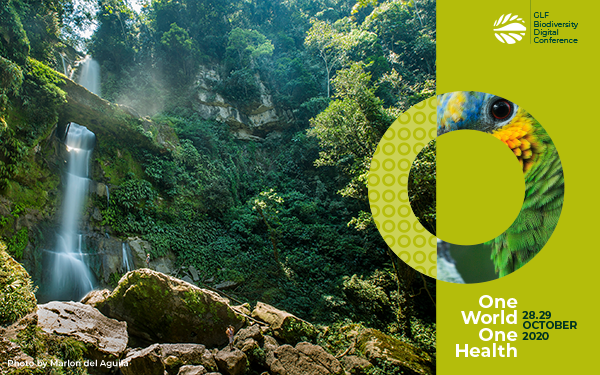The Global Landscapes Forum Biodiversity Conference will be held under the theme, ‘One World—One Health’ and will run on 28 and 29 October 2020 from 9 a.m. Bonn (UTC/GMT+1).
WHAT: Halting biodiversity loss is essential to tackle the climate, food and global health crises, but how to turn ambitious green recovery pledges into concrete solutions that are feasible to implement and fund on a large scale? In the run-up to next year’s global biodiversity talks in Kunming (China) and the UN Food Systems Summit, the GLF Biodiversity Digital Conference will bring together some of the world’s most influential voices in the environmental, health and financial fields to propose specific pathways for recovery.
- The event will present new evidence and launch major reports on issues such as the reduction of disease spillover from wildlife to humans and the creation of a global standard on environmental health.
- It will offer a chance to explore hot topics at the heart of 2021 talks such as the spread of emerging diseases along wildlife value chains; the conservation of the Amazon; the transformation of food systems; the payment for ecosystem services; the future of protected areas in the wake of COVID-19, and China’s role as the host of the 2021 Biodiversity talks.
WHEN/WHERE: Wednesday, October 28, and Thursday, October 29, starting at 9 a.m Bonn UTC/GMT +1. The full program is available here and the event will take place on the conference platform with selected content livecast on the GLF’s social media platforms.
WHO: Elizabeth Mrema, Executive Secretary of the UN Convention on Biological Diversity, will open the conference. The event will go on to explore issues at the heart of the post-2020 Biodiversity framework as well as the UN Decade on Ecosystem Restoration, the 2021 UN Food Systems Summit and green recovery efforts from COVID-19.
Speakers across the two-day digital event also include:
- Sir Robert Watson, Head of the scientific advisory group for the UNEP Global Assessments Synthesis Report. Former Chair of Intergovernmental Science-Policy Platform on Biodiversity and Ecosystem Services (IPBES) and the Intergovernmental Panel on Climate Change (IPCC)
- Ma Jun, Director of the Institute of Public & Environmental Affairs (IPE), China’s foremost environmental NGO.
- Shahid Naeem, Chair of the Department of Ecology, Evolution, and Environmental Biology at Columbia University and one of the world’s most cited environmental researchers
- Rodrigo A. Medellin, Co-Chair of the Bat Specialist Group of IUCN and Senior Professor of Ecology and Biodiversity at the National Autonomous University of Mexico
- Jennifer Morgan, Executive Director of Greenpeace
- Mark Plotkin, President of Amazon Conservation Team and ethnobotanist with decades of experience in Latin America’s tropical forests. Author of ‘Tales of a shaman’s apprentice
- Benki Piyãko, chief of the Ashaninka community leading efforts to halt deforestation and protect indigenous cultures in the Brazilian Amazon
- Gunhild Stordalen, Founder & Executive Chair of EAT Foundation. EAT chairs the action track on sustainable consumption and production of the 2021 UN Food Systems Summit
- H.E Fekadu Beyene, member of Ethiopia’s Environment, Forest and Climate Change Commission. Ethiopia has included ecosystem restoration in its COVID-19 recovery package
- Ren Wang, Special Advisor at the Beijing Genomics Institute (BGI), the world’s largest genomics organization, with focus on agriculture and international cooperation
- Melina Sakiyama, winner of the CBD’s MIDORI Prize for Biodiversity 2020
Global launches include:
- New White Paper and Policy Brief: ‘Build back Better in a post-COVID world – Reducing future wildlife-borne spillover of disease to humans’. The two publications provide guidance on how to tackle the drivers of zoonotic disease emergence and recommend ways to prevent, detect and respond to future outbreaks. Produced by the Sustainable Wildlife Management Programme, an OACPS and EU-funded initiative implemented by FAO, CIFOR, CIRAD and WCS.
- International journal: FAO announces the release of the new Unasylva edition ‘Restoring the Earth: the next decade’. It provides an overview of the progress in forest and landscape restoration in the past decade, and outlines the actions needed —nationally, regionally and globally— to step up efforts in light of the UN Decade on Ecosystem Restoration 2021-2030.
Sessions will also cover:
- Key findings of the 2020 NYDF Assessment on extractive industries and infrastructure, to be released in November 2020.
- The World Bank: the ongoing work to develop a standard for environmental health, similar to existing one for human and animal health, as part of the One Health approach; insights from the new paper ‘Finance for Nature’; and the biodiversity-focused Amazon Sustainable Landscapes Program.
